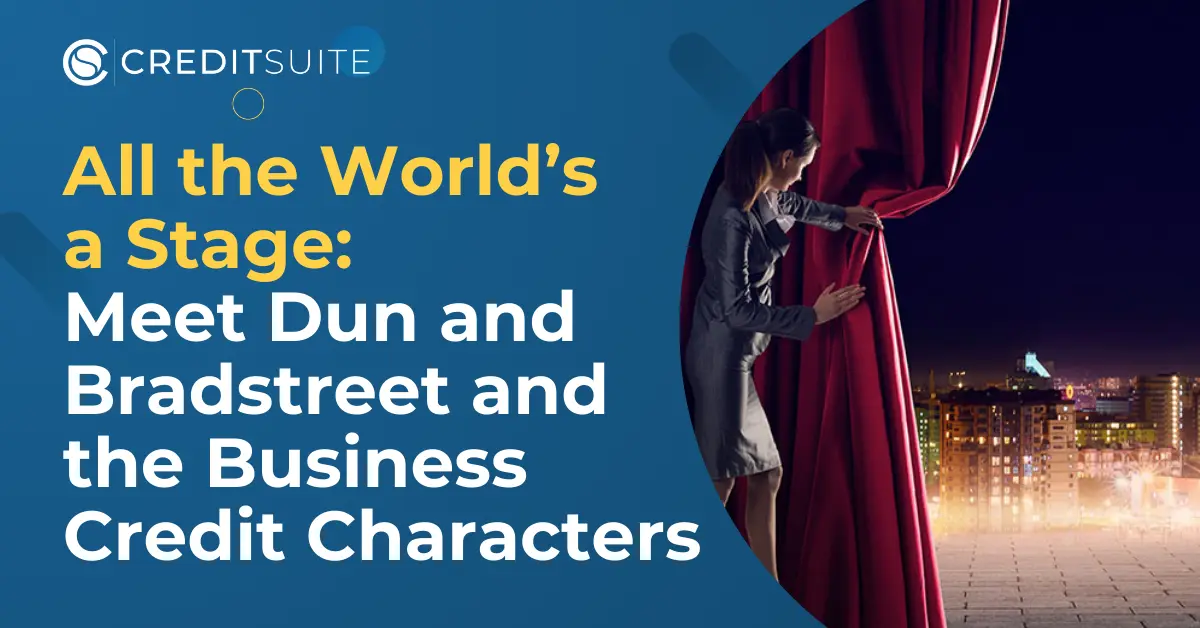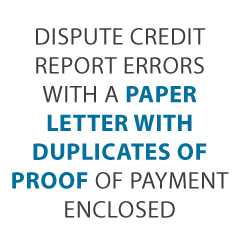Everything you Need to Know about Dun and Bradstreet and the Other Characters in the Show
All the world’s a stage they say, and when it comes to your business, business credit is the star of the show. It can make you laugh, cry, or carry you on wings that soar. It can truly be the foundation on which your business is built, or it can be the very thing that tears it down. Dun and Bradstreet has carried the title of lead player in a credit reporting agency role for years, but the supporting roles played by both Experian and Equifax bear mentioning as well.
Before we jump into the life and purpose of each, it can help to understand a little more about business credit. Why business credit? What makes it so special? Who needs it? Why does it play such a vital role in the show?
Why Business Credit?
There are a number of reasons why it is essential to actively attempt to build credit.
Shield Your Personal Credit Report
It is important to organization success that you develop business credit. Without a business credit score, your capability to fund your business rests entirely on the qualities of your individual credit score. That’s not a big deal if you have great personal credit.
However, business financing can impact your personal credit scores as well. If you finance your business on the merits of your personal credit, you will likely find your balances hover near your limits. On personal cards the limits are not as high as most business cards allow.
This has a negative effect on your credit report even if you are making your payments on time. If your business has its very own credit report, it’s not a problem. Limitations are higher, so you have a lot more credit to deal with. Regardless, it doesn’t impact your personal credit score.
When you have solid business credit, you have accessibility to funds to do the things you need to do throughout the normal course of company business. Not only that, but you can do what you need to do without worrying about depleting cash reserves.
In short, business credit opens the door to higher limits, lower interest rates, and it protects your personal finances from being affected by your business transactions.
Business Credit vs. Personal Credit: A Character Study
While their character purposes are similar, they are not the same. They play roles that are the same, but in very different circumstances. Think of the difference in a parent and a boss. Both can tell you what to do. Both can teach you, guide you, and help you thrive where you are. They are not the same however.
A parent leads and guides in your personal life, while a boss does so at work. A boss can fire you from your job, but your parents cannot. Your parents can kick you out of your house, but you boss cannot.
Personal credit and business credit kind of work the same way. Your personal score doesn’t have to affect your business, and your business credit doesn’t affect your personal finances, if you set things up properly. There are other differences as well.
Key Differences Between Personal Credit Reports and Business Credit Reports:
- Personal FICO scores range from 300 to 850
- Business credit scores usually range from 0 to 100.
- FICO algorithms are commonly used by consumer credit bureaus to generate a credit score.
- Business credit scores do not follow industry standard algorithms, meaning they can vary greatly between credit reporting agencies.
- Business credit usually include only accounts that are in your company’s name. Your personal accounts are on your personal credit report.
- You can get a free copy of your personal credit report from the three major consumer credit reporting agencies each year. This includes Experian, Equifax, and TransUnion. There are also several free options for getting a glimpse at your credit scores at any given time.
- Business credit is quite different when it comes to accessibility. You have to pay to see your company’s credit report and to find out the score at all three major business credit reporting agencies, including Dun and Bradstreet, Experian, and Equifax.
- Not just anyone can see your personal credit report, but business credit reports are public. Anyone that wants to pay can see your business credit.
Dun and Bradstreet: The Star of the Show
So, who is the star of the business credit report show? It’s a unanimous vote for Dun and Bradstreet. They are the oldest and most commonly used business credit reporting agency. They offer way more than just a single business credit score. There are multiple reporting options that lenders can choose from to assess the credit worthiness of a specific business.
Following is a breakdown of what they offer, with an explanation of what it all means and why they are a credit reporting super star.
Credit Reporting at Dun and Bradstreet: What Does Dun and Bradstreet Do?
The quick answer is they provide lenders with business credit reports to help them make lending decisions.
There are six different Dun and Bradstreet reporting options, all measuring different areas of credit worthiness. The most commonly used and simplest to understand Dun and Bradstreet credit report is the PAYDEX.
Generally speaking, this is the Dun and Bradstreet credit score most like the consumer FICO score. It measures the speed of payment and ranges from 1 to 100. A 70 or higher is “good.” For example, a score of 100 means that the company makes payments in advance, and a score of 1 indicates that they pay 120 days late, or more.
Without Further Ado: The Many Faces of the Dun and Bradstreet Credit Report
In addition to the PAYDEX, there are many other options for a business credit report. Dun and Bradstreet offers several different types.
Dun and Bradstreet Delinquency Predictor Score
The delinquency predictor score measures the likelihood the company will not pay, will be late paying, or will fall into bankruptcy. The scale is 1 to 5, and a 2 is considered good.
Financial Stress Score
The financial stress score is a measurement of the pressure on a company’s balance sheet. It indicates the likelihood of a shutdown within a year. It measures with a minimum of 5 and a maximum of 1, with a score of 2 being a good thing.
Supplier Evaluation Risk Rating
This is a rating that ranks the odds of a company surviving 12 months. The minimum score is a 9 and the maximum is 1. A score of 5 is good.
Credit Limit Recommendation
The credit limit recommendation shows a business’s borrowing capacity. It is a dollar amount recommendation for how much debt a company can handle. Typically it is used by creditors to determine how much credit to extend.
D&B Credit Rating
This is an estimation of overall business risk on a scale of 4 to 1. A two is considered good. The rating is given in conjunction with letters, the combination of which indicate a company’s net worth.
Even if there isn’t enough information on a business to assign a regular rating, Dun and Bradstreet will assign what they call a Credit Appraisal Score. This is based on number of employees. Another option is an alternative rating based on what data is actually available.
It is also important to note that the letter portion of this rating cannot be assigned as good or bad, as net worth is not necessarily an indicator of how stable a business is.
What Goes into a Dun and Bradstreet Credit Rating?
The various scores and ratings are based on data that they receive from a number of places. The first source is the business itself, but they also tap into public records. A business must submit a financial statement to D&B before they can have a full rating. In the absence of that, a limited rating will be issued based on number of employees.
For example, the rating would be 1R if the business has 10 employees or more, and 2R if they have less than 2 employees.
A composite credit appraisal may also be available in the absence of a financial statement. A business is only eligible for a rating up to a 2 in this case however. They are ineligible for a 1 rating without a financial statement.
In addition to self-reporting financial statements, you can self-report trade references to D&B, which makes it easier to build business credit faster. You will need a DUNS number to have a credit report with them at all, but that is free and easy to get on their website.
Dun and Bradstreet and the Commercial Credit Score
The commercial credit score is the term used to describe the actual business credit score. It has three separate parts, and each predicts how likely the business is to default on bills or become delinquent. Following are the three parts and the scales by which they are ranked.
Commercial credit score
Measured on a scale of 101 to 670, it predicts the probability of a company becoming delinquent. A score of 101 is most probable, so that’s bad. A score of around 500 is good.
Commercial credit percentile
This is measured on a scale of 0 to 100. It measures the probability of delinquency as well, but against other companies in the Dun and Bradstreet system. A score of 1 is the highest probability compared to other businesses in the system, and most say a score of 80 is good.
Commercial credit class
This is a method of dividing businesses into classes based on the probability of delinquency. Companies in class 1 are the least likely to be delinquent. If you are in class 2, that’s good.
Who Are the Other Characters?
In this great show of business credit reporting agencies, it can be easy to forget there are other players when Dun & Bradstreet seems to shine so bright. There are, however, other agencies that offer business credit reports.
Equifax
They collect their information in ways not unlike Dun and Bradstreet, including: information from public records, financial data from the business, and payment history from creditors. In addition, they factor information about credit utilization, or how much credit a business is currently using versus how much they have available, into their calculation.
They then use the information collected to generate various scores. These scores include the business credit risk score and the business failure score. The business credit risk score measures how likely it is that a business will become 90 days or more delinquent on bills over the next 12 months. It ranges from 101 to 992.
The business failure score ranges from 1,000 to 1610, and it predicts how likely it is that the business will file for bankruptcy over the next year. The lower the score, the higher the risk.
Another score they offer is the business payment index. This is their version of the D&B PAYDEX, and it even runs on the same scale, 0 to 100. It indicates payment history over the past year. Different from the PAYDEX however, you have to reach a score of 90 or higher for it to be a “good” score.
Equifax also offers business identity reports that serve as confirmation that a company actually exists. It also verifies details such as the company’s tax ID, number of employees, and yearly sales.
Equifax does not allow business owners to request a report on their company. They decide themselves when to start a credit file on a specific company.
Experian
Experian’s credit ranking, Intelliscore, uses more than 800 variables to predict a company’s risk of defaulting or becoming delinquent. A 76 or higher is considered good with Intelliscore. That indicates a low risk of late payments or default. A score from 51 to 75 indicates a low to medium risk and 26 to 50 indicates medium risk. From 25 down 1 is medium high to high risk.
Intelliscore is considered a blended score of both the business and business owner’s information. It offers insights into a business’s public record findings, collections, payment trends, and overall business background. A major difference between Experian and the other two characters is that they do not ask businesses to self-report at all.
Rather, they collect all the information themselves. Since it includes personal information, you do have to give permission for a lender to view this report.
Specifically, the Experian credit ranking gives insights into a company’s payment trends, public record filings, collections, and general business background. The result is a blended score calculated using both the business and business owner’s information.
The Experian Database and Credit Report Generation
Experian’s database has information on over 27 million businesses. Reports are generated with information from the database, which houses information on bankruptcy filings, payment history, collections, banking, insurance, and leases.
There has to be a minimum amount of information in the database about a business before Experian will generate a score for it. There must be at least one tradeline in the system, so you should definitely do business with a company that will report to Experian if you want to build business credit.
Applause or Rotten Vegetables: Which Credit Reporting Agency Really Matters?
All the players are important for this reason. You do not know, and cannot choose, which one your lender will use to base their decision upon. This means it is important to build strong business credit with each one. While a lot of this is out of your control, you can choose which starter vendors you work with.
Since not all starter vendors report to all credit reporting agencies, you need to make sure you do business with a variety that report to each one. Then you can be on your way to building strong business credit.



